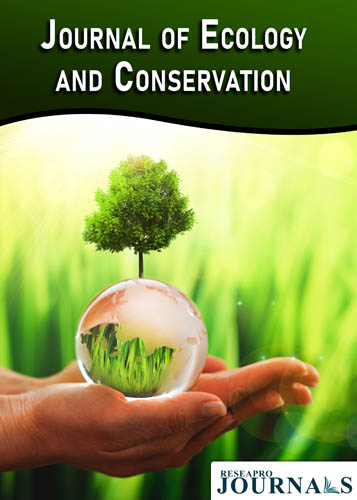
Journal of Ecology and Conservation
OPEN ACCESS
ISSN: 3048-5177

OPEN ACCESS
ISSN: 3048-5177

1Freelance, Gedaref State, Sudan
2Department of Forest Management Science, Faculty of Forest Sciences and Technology, University of Gezira, Wad Medani, Sudan
3Department of Documentation and Publication, Deanship of Scientific Research and Innovation, University of Gezira, Wad Medani, Sudan
Background: This research analyzed the effects of human disturbances, particularly harvesting of tree products and livestock grazing, on pollinators, soil nutrients, and tree diversity and composition in Dinder Biosphere Reserve, Sudan. Methods: The research was carried-out in 150 randomly selected sample plots (1000m) across the three zones of DBR. Additionally, 210 key informant interviews and questionnaires were purposively conducted in six villages surrounding the reserve. A two-way analysis of variance, linear regression, descriptive statistics, and Shapiro-Wilk and Tukey’s Post Hoc tests at 0.05 were used for data analysis. Results: Outcomes show that tree species diversity, insect pollinators, and natural regeneration in transition zone were half that of core zone (F = 127.3 and P < 0.001; F, = 142.4 and P = 0.001; F, 147 = 138.2 and P = 0.021, respectively). (F, = 92.8 and P = 0.001; F, = 91.3 and P < 0.001; F, = 101.2 and P < 0.001, respectively), with a positive relationship with mean tree crown diameter (R = 0.78, β = 0.55, P < 0.001). Moreover, the fruit production was significantly varied across the three zones. Conclusion: We concluded that illegal harvesting of forest tree products and the intensive livestock grazing negatively impacted the provisioning, regulatory, and nutrient cycling services of DBR ecosystem and deteriorated the species diversity and food security of local peoples within and around the reserve.
Received 12 January 2024; Revised 07 February 2024; Accepted 15 February 2024
1Freelance, Gedaref State, Sudan
2Department of Forest Management Science, Faculty of Forest Sciences and Technology, University of Gezira, Wad Medani, Sudan
3Department of Documentation and Publication, Deanship of Scientific Research and Innovation, University of Gezira, Wad Medani, Sudan